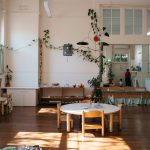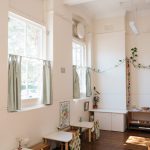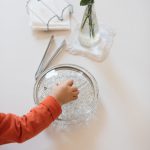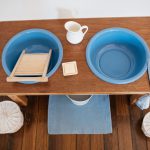The Prepared Environment

“The Director’s and parents’ skill in not interfering comes with practice, like everything else, but it never comes very easily. What advice can we give to mothers? Their children need to work at an interesting occupation; they should not be helped unnecessarily, nor interrupted once they have begun to do something intelligent.” Maria Montessori
ISMS offers a range of early childhood programs at our Balmain campus.
A parent/carer attends one session a week with their child, in an environment specially prepared to facilitate the child’s growing need for independence.
The room contains child sized furniture and activities that match the children’s physical proportions and their stage of development.
All Montessori materials are developmentally appropriate for the children and have been designed to meet the intellectual and social needs of children, in the particular age group; in this case children from pregnancy to 3 years of age. Materials are beautifully displayed and well kept, allowing them to be aesthetically pleasing and engaging for the children. All materials are accessible for children to use and put away as needed. Parents are made aware of the importance of allowing their children to complete and repeat tasks without interruption or interference. In this way children build concentration. These and other principles of the Montessori environment, provide parents with hands-on experience of the practical application of the Montessori philosophy of education that can be applied at home.
Dr Maria Montessori’s approach to education is essentially an “aid to life”. It is about assisting the development of human beings during their formative years and, therefore, goes beyond the concept of education as in “school” or “curriculum”.
“Our work as adults does not consist of teaching, but in helping the infant mind in its work of development.” Maria Montessori
Topics covered and the activities children are engaged with include:
| The Nest | Nido andToddler Transition | Parent Toddler Program (PTP) and Transition to Stage 1 |
| Introduction to Montessori | Observation | Care of self |
| Environment preparation | The Senses | Care of the environment |
| First two months of life | The Brain | Food preparation |
| Physical care | Hand-eye co-ordination | Sensorial development |
| Movement | Language and enrichment of language | Hand-eye coordination |
| Communication | Music | Language development and enrichment |
| The Senses | Independence | Art and craft |
| Attachment and separation | Gross motor movement | Music |
| Role of second parent | Fine motor movement | Natural science experiences |
| Preparation of the adult | Social relationships | Gross motor movement |
| Equipment and materials | Fine motor movement | |
| Social relationships |
Dr Montessori believed that the first three years of life form the foundation for the rest of our lives.
The overall objective of the ISMS Infant Community is to increase parents’ awareness of the child’s capabilities and need for independence. Participation in the Infant Community environment each week provides a special environment which benefits the relationship between the parent/carer and the child. It is not the intention to give parents a textbook on Montessori or parenting; on the contrary, Directors pass on some of Maria Montessori’s observations in the hope that they will enrich the life with the child. Soon, these observations support parents and carers so they become more observant and able to draw their own conclusions about the development of their child, just as Dr Montessori did. In this way, the Infant Community assists both parents and children.






